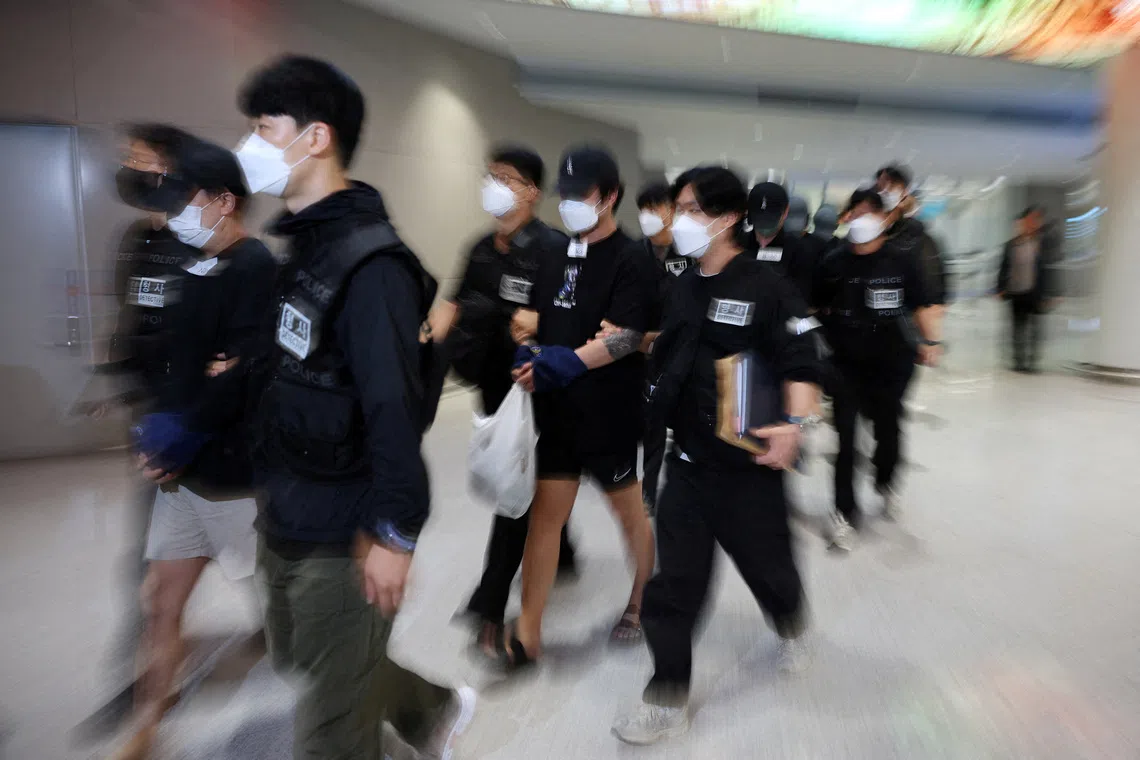S. Korean intelligence identifies suspect behind murder of undergrad in Cambodian scam compound
Sign up now: Get insights on Asia's fast-moving developments

Police officers escort South Korean deportees suspected of being involved in online scam operations in Cambodia, upon their arrival at the Incheon International Airport on Oct 18.
PHOTO: REUTERS
SEOUL – South Korea’s National Intelligence Service (NIS) has identified the suspect behind the murder of a Korean university student
According to Representative Park Sun-won of the Democratic Party of Korea and Representative Lee Seong-kweun of the People Power Party on Oct 22, the NIS revealed its findings related to the case during a closed-door session of the National Assembly’s Intelligence Committee earlier the same day.
The lawmakers told reporters that the NIS had obtained its first lead on the case surrounding the Korean student’s murder within three days of the student’s death and confirmed the suspect’s identity within eight days by mobilising its full intelligence capabilities.
The suspect, who is currently still on the run, is being tracked by the NIS in coordination with Cambodian authorities.
The NIS believes the suspect worked with a man identified as “Remo”, who is detained in Cambodia and was an alleged accomplice in a drug distribution case in Seoul’s Daechi-dong in 2023.
The case involved Chinese nationals and local accomplices distributing methamphetamine-laced drinks — falsely marketed as “focus enhancers” – to teenagers in Gangnam’s education district.
According to Mr Park, the NIS also reported that some 1,000 to 2,000 Koreans are believed to have been involved in romance scam operations in Cambodia.
According to Cambodian police data shared by the NIS, of the 3,075 scam suspects arrested between June and July in 2025r, 57 were Korean nationals.
Around 50 scam compounds are estimated to be located in cities like Phnom Penh and Sihanoukville, holding an estimated 200,000 criminals and generating up to US$12.5 billion (S$16.2 billion) annually – nearly half of Cambodia’s gross domestic product.
Some zones are also reportedly controlled by non-governmental armed groups, while others are located in special economic zones, making enforcement difficult and complicating international cooperation.
In addition to concerns over challenges in legal enforcement, local media in Cambodia reported that members of scam syndicates were fleeing compounds in Sihanoukville rescue hundreds of Korean nationals
Surveillance footage reported by local media showed scam syndicate members loading equipment, such as phones and computers, onto large buses and vans in an apparent attempt to flee the country.
Such groups are expected to be heading toward Laos, which borders Cambodia, or further north towards Myanmar.
In both countries, scam compounds are reported to be already well-established with weaker law enforcement.
Employment scams of a similar nature to those in Cambodia have also been reported in both countries, according to data revealed by Representative Kim Geon of the People Power Party.
Laos and Myanmar each logged 28 reports and 3 reports related to employment scams in 2024, respectively.
The National Assembly’s Foreign Affairs and Unification Committee also continued its parliamentary audits on Oct 22 at the Korean Embassy in Cambodia, joined by officials from embassies in Vietnam, Thailand and Laos.
Lawmakers were expected to question the Korean mission in Phnom Penh on whether it had faithfully responded to the scam-related crimes involving South Koreans over the recent surge in abductions and detentions by scam syndicates in the country and neighbouring countries.
South Korean authorities estimate that around 1,000 Koreans remain forcibly detained in Cambodian scam compounds, with around 80 individuals currently unaccounted for.
Meanwhile, North Gyeongsang Province revealed on Oct 22 that it has suspended all official development assistance projects it planned to conduct or was conducting in Cambodia in response to the recent controversies.
The university student who was tortured to death and whose cremated remains were returned on Oct 21
The provincial government had initially allocated 750 million won (S$680,260) in 2024 for supporting development projects related to agriculture, as the province had long maintained close development cooperation with the South-east Asian country in rural infrastructure and safety equipment. THE KOREA HERALD/ASIA NEWS NETWORK


